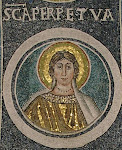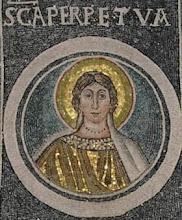Since Lambeth 1988 dealt with polygamy, I looked ahead to see how it is presented in the Episcopal Life Bulletin Insert for Sunday June 22, 2008. What I see is one sentence early on:
If the bishops could not agree on homosexuality, they did find themselves able to agree to reverse themselves on a stand taken one hundred years earlier and allow the baptism of polygamists if they promise not to marry again and if the local community were agreeable.And then another sentence toward the end:
In regard to gender and sexuality, earlier positions take on polygamy, birth control, and remarriage after divorce have been reversed.I look forward to the Anglican Curmudgeon's fisk.
Here is how Andrew Proud presented the 1988 Lambeth Conferences decisions on polygamy in Split identities, divided loyalties for Global South Anglican. He says:
Lambeth 1988 addressed this issue and concluded that, if you come from a polygamous culture, you should not cast off your wives when you become a Christian but that, once you are baptised, you should not take on further wives. It further concluded that, if you are an ordained leader, you should be the husband of one wife.So, it appears to me that the Episcopal Church is leaving out that inport second part about who should be given positions of leadership.
Actually, I think we should look at Andrew Proud's whole paragraph about polygamy:
I should note, at this point, that we are not immune to the impact of the surrounding culture on Christianity in Ethiopia. The issue of polygamy amongst the people groups we work with has caused pain and difficulty on all sides. For semi-nomadic pastoralists, like the Nuer, levirate marriage is a way of taking responsibility for and caring for the clan. If your father or your brother dies, you have a duty to marry his wives and have children by them, even if you are already married. This is regarded as a sign of respect to your immediate family, ensures the survival of the clan and fulfils a moral duty to a wife and children who might otherwise be left behind when the tribe moves on with the cattle. Lambeth 1988 addressed this issue and concluded that, if you come from a polygamous culture, you should not cast off your wives when you become a Christian but that, once you are baptised, you should not take on further wives. It further concluded that, if you are an ordained leader, you should be the husband of one wife. This is now part of official policy in the selection and training of candidates for ordination within the Diocese of Egypt, North Africa and the Horn of Africa. However, before it became such, we faced the painful situation of having to remove two ordained leaders from their posts for trying to conceal their polygamous marriages. Both were suspended initially, pending investigation. One, removed from his post, is still a deacon but is now working happily as the administrator of our parishes in the western region of Ethiopia. The other caused us great difficulty [xxvi] . Since then, a further case arose, but in this instance the man, fully understanding our position, resigned his post as soon as his father died, because he wanted to be free to fulfil his clan obligations by adopting his father’s wife as his own. We are in no position to throw stones.
And in the footnote he tells a very interesting story:
[xxvi] I personally, had death threats made against me by this man, who had several of our churches locked, at gun-point, by the police, having made use of his influence with fellow clan members amongst the officials. He further attempted to frustrate our work by causing tension and discord amongst the Nuer clans.
Although polygamy and homosexuality are not exactly parallel, it is a rich comparison. First there is the issue of leadership versus baptism. While Lambeth 1988 made that distinction, the Episcopal Church bulletin insert leaves it out. And the Episcopal Church has claimed that anyone who is baptized is fully qualified for leadership. So it may not be safe to try to make this distinction with regard to homosexual behavior: The Episcopal Church has demonstrated their inability to make distinctions between the qualifications for joining the church and for leading it.
H/T to Stand Firm





3 comments:
When your ordained clergy is making death threats, we in the South would say that religion "didn't take" in that instance.
Perpetua, I have posted my fisk of the June 22 bulletin now. However, I could not find in the text of the 1988 Lambeth Resolutions anything that ties to the statement by Andrew Proud that the bishops decided that to be ordained, a person would have to be the husband of one wife. The resolution on polygamy is here, and it says nothing about that. So while I very much would have liked to point out how the bulletin editor left out the bit about ordained ministers, I could find nothing to back up Father Proud's assertion.
Thank you so much!
I've gone over to the Global South Anglican website and posted this comment:
Dear Rev. Proud,
Would you please help us find the Lambeth resolution you refer to in your second sentence here:
Lambeth 1988 addressed this issue and concluded that, if you come from a polygamous culture, you should not cast off your wives when you become a Christian but that, once you are baptised, you should not take on further wives. It further concluded that, if you are an ordained leader, you should be the husband of one wife.
We do find Resolution 26 in the online Lambeth Conference Archives but, it does not have the part about ordained leadership there:
Resolution 26: Church and Polygamy
This Conference upholds monogamy as God’s plan, and as the ideal relationship of love between husband and wife; nevertheless recommends that a polygamist who responds to the Gospel and wishes to join the Anglican Church may be baptized and confirmed with his believing wives and children on the following conditions:
(1) that the polygamist shall promise not to marry again as long as any of his wives at the time of his conversion are alive;
(2) that the receiving of such a polygamist has the consent of the local Anglican community;
(3) that such a polygamist shall not be compelled to put away any of his wives, on account of the social deprivation they would suffer;
(4) and recommends that provinces where the Churches face problems of polygamy are encouraged to share information of their pastoral approach to Christians who become polygamists so that the most appropriate way of disciplining and pastoring them can be found, and that the ACC be requested to facilitate the sharing of that information.
Post a Comment